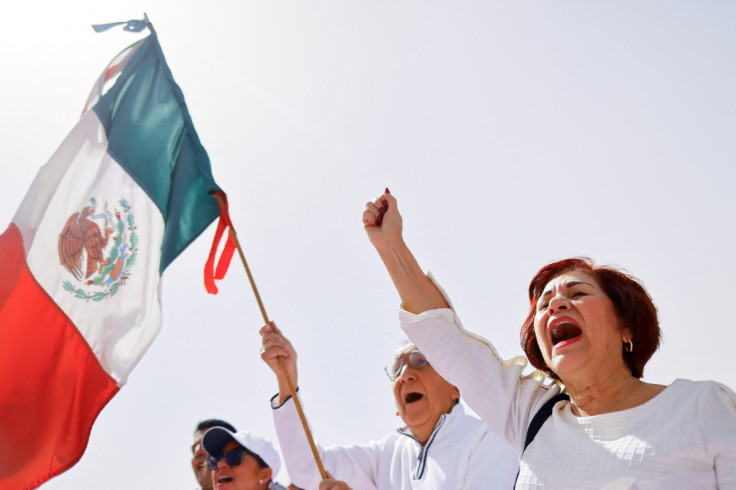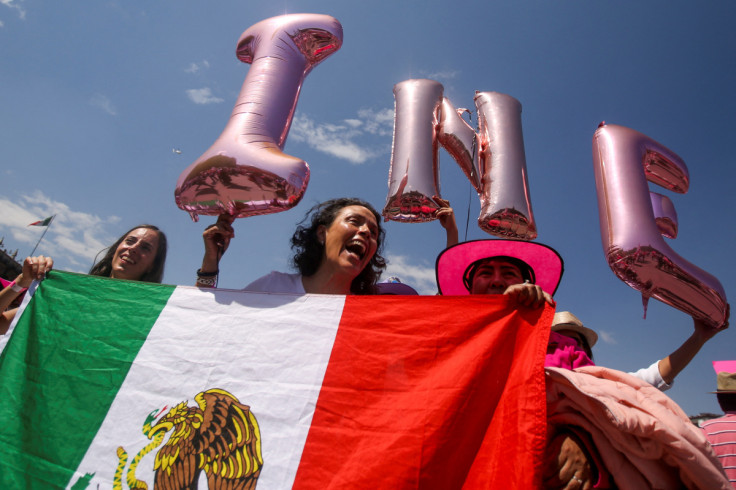In Mexico Thousands Protest Electoral Overhaul They Say Threatens Democracy

Huge crowds gathered across Mexico on Sunday to oppose a government drive to shrink the independent electoral authority, arguing the changes threaten democracy, in what appeared to be the largest protests yet against President Andres Manuel Lopez Obrador's administration.
Organizers said in Mexico City over 500,000 people attended, with video footage on social media showing a central Zocalo square filled with protesters. One police officer nearby said he had heard the half a million figure, while others gave lower estimates.
Mexico's Congress last week approved a major overhaul of the National Electoral Institute (INE), which Lopez Obrador has repeatedly attacked as corrupt and inefficient.
The president denies the changes will weaken Mexican democracy, but critics have vowed to take the legislation, which slashes the INE's budget and staff, to the Supreme Court.
Veronica Echevarria, a 58-year-old psychologist from Mexico City taking part in the protest, said she was worried Lopez Obrador's overhaul of the INE was an attempt by him to take control of the electoral authority so he could stay in power.
"We're fighting to defend our democracy," she said, wearing a cap emblazoned with the words "Hands off the INE."
She and thousands of others converged towards the Zocalo via the city's Paseo de la Reforma Boulevard on Sunday morning, many of them holding Mexican flags and dressed in pink, the color of the INE.
Shouts of "Lopez out!" also rang out periodically.
The INE and its predecessor played a key role in creating a pluralistic democracy that in 2000 ended decades of one party rule, according to many political analysts.
Fernando Belaunzaran, an opposition politician who helped to organize the protests, warned the changes weakened the electoral system and increased the risk of disputes clouding the 2024 elections when Lopez Obrador's successor will be chosen.
"Normally presidents try to have governability and stability for their succession, but the president is creating uncertainty," said Belaunzaran. "He's playing with fire."
Belaunzaran said on Twitter on Sunday there would be protests in more than 100 cities. He said over 500,000 people had gathered in the capital to oppose the changes.
Mexican presidents may only serve a single six-year term.
Angel Garcia, a 50-year-old Mexico City lawyer, said the demonstration was also "an appeal to the Supreme Court to rule the overhaul was in breach of the constitution."
Sunday's protest was one of the "last chances" to protect the INE, and failure to do so would send Mexican democracy "back to the past," he said.
"It's now or never," he added.
Lopez Obrador, a 69-year-old leftist who contends he was robbed of the presidency twice before he finally romped to a crushing victory in the 2018 election, argues the INE is too expensive and biased in favor of his opponents.
The institute denies this.
According to the INE, the president's overhaul violates the constitution, curbs the institute's independence and eliminates thousands of jobs dedicated to safeguarding the electoral process, making it harder to hold free and fair elections.
Lopez Obrador has also weakened other autonomous bodies that check his power on the grounds they are a drain on the public purse and hostile to his political project. He says his INE shake-up will save $150 million a year.
Polls show the president's National Regeneration Movement (MORENA), which in just a few years has become the dominant force in Mexico, is a strong favorite to win the 2024 election.
Over the years the Zocalo has hosted many rallies fronted by Lopez Obrador, both as president and during his long career as an opposition scourge of the Mexican establishment.
Antonio Mondragon, an 83-year-old at the protest who said he voted for Lopez Obrador in 2018, argued people were fed up with the president behaving like a "dictator."
"We need to get back to being a democracy, because the man is going mad," Mondragon, a retired dentist from the capital, said of the president.

© Copyright Thomson Reuters 2024. All rights reserved.





















